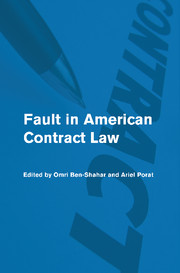Book contents
- Frontmatter
- Contents
- List of Contributors
- Preface
- Acknowledgment
- I THE CASE FOR STRICT LIABILITY
- II THE CASE FOR FAULT
- III BETWEEN STRICT LIABILITY AND FAULT
- IV WILLFUL BREACH
- V COMPARATIVE FAULT
- VI THE MORALITY OF BREACH
- 17 Why Breach of Contract May Not Be Immoral Given the Incompleteness of Contracts
- 18 Fault and Harm in Breach of Contract
- 19 Fault in Contracts: A Psychological Approach
- Case Index
- Subject Index
- References
19 - Fault in Contracts: A Psychological Approach
Published online by Cambridge University Press: 10 November 2010
- Frontmatter
- Contents
- List of Contributors
- Preface
- Acknowledgment
- I THE CASE FOR STRICT LIABILITY
- II THE CASE FOR FAULT
- III BETWEEN STRICT LIABILITY AND FAULT
- IV WILLFUL BREACH
- V COMPARATIVE FAULT
- VI THE MORALITY OF BREACH
- 17 Why Breach of Contract May Not Be Immoral Given the Incompleteness of Contracts
- 18 Fault and Harm in Breach of Contract
- 19 Fault in Contracts: A Psychological Approach
- Case Index
- Subject Index
- References
Summary
Although the role of fault in contract law has traditionally received little theoretical or doctrinal attention, it is central to commonsense moral theories of contract. Most people believe that breaking a promise is wrong, and that breach of contract is a form of promise breaking. Parties' moral intuitions may affect their willingness to breach when it is otherwise efficient to do so, their ability to reach settlement once a contract has been breached, their predictions about legal rules of contract, and their post hoc assessments of appropriate damages. This chapter reviews experimental research on the effects of moral norms on contracting. Behavioral studies show that many people believe that breach of contract is a moral harm irrespective of actual losses suffered by the promisee. It is argued in the chapter that moral norms often act as default rules in legal decision making about contracts when a contingency is unspecified in the contract.
Although the role of fault in contract law has traditionally received little theoretical or doctrinal attention, it is central to commonsense moral theories of contract. Most people believe that breaking a promise is wrong, and that breach of contract is a form of promise breaking. In fact, evolutionary psychologists have identified the rule of honoring contracts as one of only three universal moral norms.
Behavioral research has begun to address the role of moral intuition in legal decision making. This chapter reviews experimental research on the effects of moral norms on contracting.
- Type
- Chapter
- Information
- Fault in American Contract Law , pp. 289 - 304Publisher: Cambridge University PressPrint publication year: 2010



